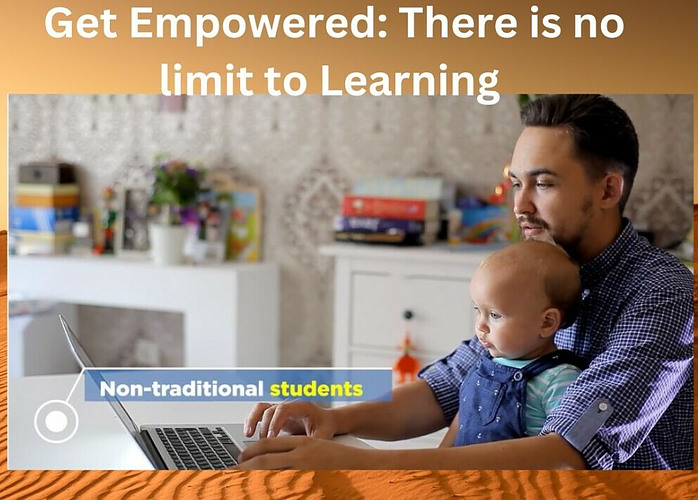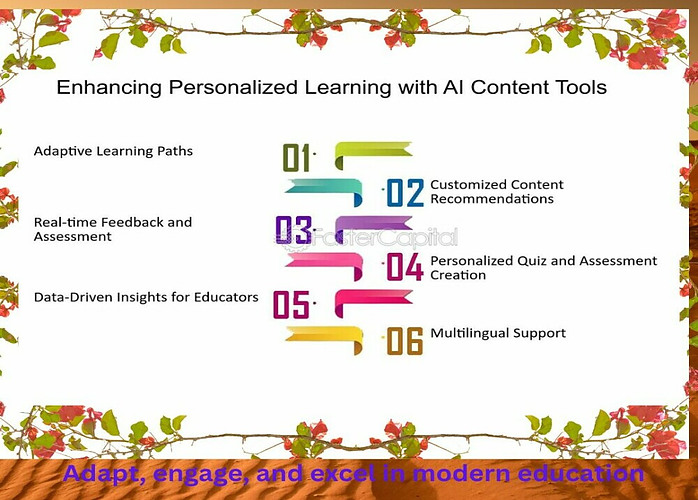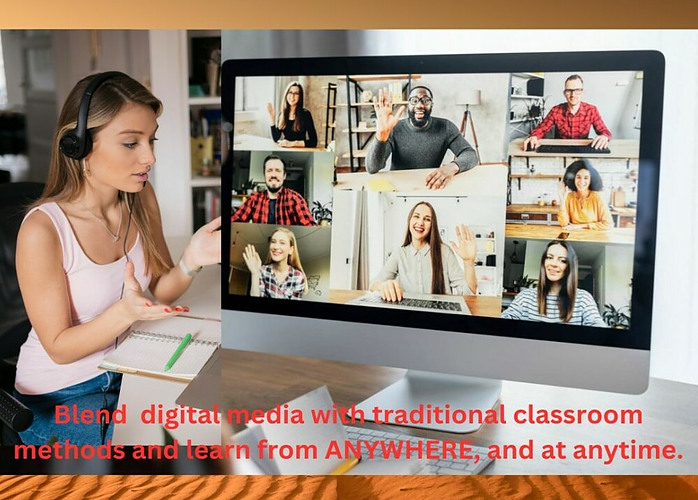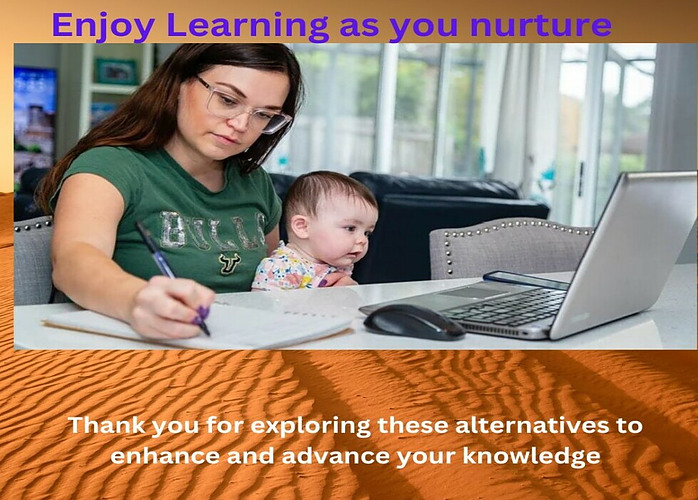Discover innovative ways to empower nontraditional learners with unconventional training methods. Adapt, engage, and excel in modern education

Introduction
Are you 25 years of age or older? Are you married? Are you a parent, a veteran? Are you returning to school after an absence (usually 3 or more years)? If your answer is yes to any of the above questions, then you qualify to be in the category of non-traditional learners.
This category of learners are generally balancing studies with other commitments. They include; marriage, parenting, work and maintaining a home, which compete for your time and in the long run this can create stress! Because you have a strong desire to be back in school, you can make it work, but you may need to make some adjustments.
In this post I am going to take you through why today’s rapidly changing world calls for adaptive learning methods, especially for adult education. You know, it is not just children who benefit from innovative approaches to learning; adults too, with their complex lives and varying experiences bring a whole different set of needs to the classroom.
Let us embark on a journey where we shall explore key differences between traditional learners, who typically follow a set academic pathway right out of high school, and nontraditional learners, who may be returning to education after a gap, juggling a career, or caring for a family. As you will discover, this is not just about age; it is also about circumstances, responsibilities, and the type of education one is seeking.
In my opinion, it is crucial that we look beyond the conventional classroom setup. Essentially, the one-size-fits-all model is outdated in the face of unique adult learning requirements. As such, we have to explore a diversity of unconventional methods offer to the education landscape.
This may include, among other, stories of individuals who have transformed their lives through flexible and innovative education. Such stories not only inspire but also showcase the effectiveness of these unconventional methods. Pretty wild, right? Let us delve into details.
Innovative Learning Techniques for the Modern Mind
As highlighted above, there are changing demographics which would also require some truly game-changing techniques in education. One such techniques that stands out is gamification, which taps into the competitive spirit and reward systems that acts as a motivator.
Typically, gamification is the strategic attempt to enhance systems, services, organizations, and activities by creating similar experiences to those experienced when playing games in order to motivate and engage users.
I am talking about points, badges, leader-boards—you name the game element, which is being used to make learning stick.
Now, what sets apart today’s learners is their unprecedented access to technology. Typically, Artificial Intelligence [AI] and Adaptive Software [AS] are carving out personalized learning paths that cater to individual paces and preferences. This is not just about convenience; it is also about effectiveness and retaining what you learn for long-term.
 Besides, let us not overlook the rising trend of collaborative learning environments—think breakout rooms in virtual classes or discussion boards on learning platforms. These collaborative spaces are not just for bouncing ideas off one another; No! They are like crucibles for innovation, where peers challenge and inspire one another to reach new heights in understanding.
Besides, let us not overlook the rising trend of collaborative learning environments—think breakout rooms in virtual classes or discussion boards on learning platforms. These collaborative spaces are not just for bouncing ideas off one another; No! They are like crucibles for innovation, where peers challenge and inspire one another to reach new heights in understanding.
If you want to tap into these cutting-edge educational resources, you can always adjust your approach down the road. Starting sooner will help you adapt more quickly to the rhythms of modern learning. Just do not focus too much on perfection—choose something that resonates with you, and dive in.
Transforming Challenges into Opportunities for Nontraditional Learners
If you are a nontraditional learner, you know the drill. The road to enhancing your skills is not always lined with red carpets, and conventional lecture halls might not do the trick. That is where unconventional training methods come into play, carving out the way for people like you can seize on the learning opportunities that match your unique lifestyle and learning style.
So, what makes these methods different? They are flexible, they are varied, and they are designed with YOU in mind. Say goodbye to rigid schedules and one-size-fits-all courses. With techniques like micro-learning, whereby one learns new information in small units or what can be described as bite-sized modules – you can build knowledge at your own pace, and around your very own life commitments.
The potential for challenge turns into opportunity when resources cater to real people with real lives – which is the essence of resourcefulness in the realm of education. Think about it. You have got work commitments, family responsibilities, and unpredictable schedules. Yet, with unconventional training, tools like mobile apps and online platforms allow you to learn from ANYWHERE, and at anytime.
Furthermore, with these strategies one’s doors for your growth become opened. Blended learning models, for example, combine online digital media with traditional classroom methods. This gives you a taste of both worlds and is especially handy for those who still appreciate the in-person touch, but also need the convenience of logging in from home.

This is not all! There is also the social element. One may assume that nontraditional means non-social. No; not at all! Online forums and virtual workshops foster connections with peers from diverse backgrounds worldwide, offering support, perspective, and a sense of community.
This is not just about overcoming barriers; it is about transforming them into stepping stones. The aim is to help you build a skill set that is broad, adaptable, and in tune with modern demands.
Explore the World of Learning with a Dynamic Training Platform
As we have explored various unconventional training methods that cater to the unique needs of nontraditional learners, it is clear that the right environment can make all the difference in a learner’s journey. Among the various training platforms, Wealthy Affiliate truly outshines, for it offers a dynamic platform designed to empower individuals ready to take control of their learning.
There is a lot of opportunity in Wealthy Affiliate’s community-driven approach. This is a platform that is continuously updating its tools, to meet the demands of its clientele. This enables it to provide a suite of tools and a supportive network that encourages growth and innovation in learning. Whether it is their interactive lessons, engaging webinars, or a wealth of resources, Wealthy Affiliate has positioned itself as a hotspot for those eager to learn at their own pace and on their own terms.
Moreover, Wealthy Affiliate is more than just an educational resource; it is a place where ideas are put into action, a platform where one can test the waters of entrepreneurship, and above all it is a place where one can gain real-world skills that are immediately applicable to his/her personal and professional life. The success stories of Wealthy Affiliate users are a testimony to the efficacy of its learning model, which integrates knowledge with hands-on practice.
Conclusion
In conclusion, the world of education is dynamic, and adapting to unconventional learning methods can unlock incredible opportunities for growth. Whether it is embracing gamification, micro-learning, or blended models, the key lies in finding what resonates with your unique journey. While Wealthy Affiliate is one such platform offering a diverse learning environment, there are many avenues to explore.
Are you ready to embrace a learning experience tailored to your goals? Take the plunge, explore these innovative methods, and witness your aspirations transform into accomplishments

I hope you have enjoyed reading about the unconventional training methods and if you have any questions or comments, please leave them in the box below and you will be answered within 24 hours.
Thank you.
Cheers
Joseph Hawumba
